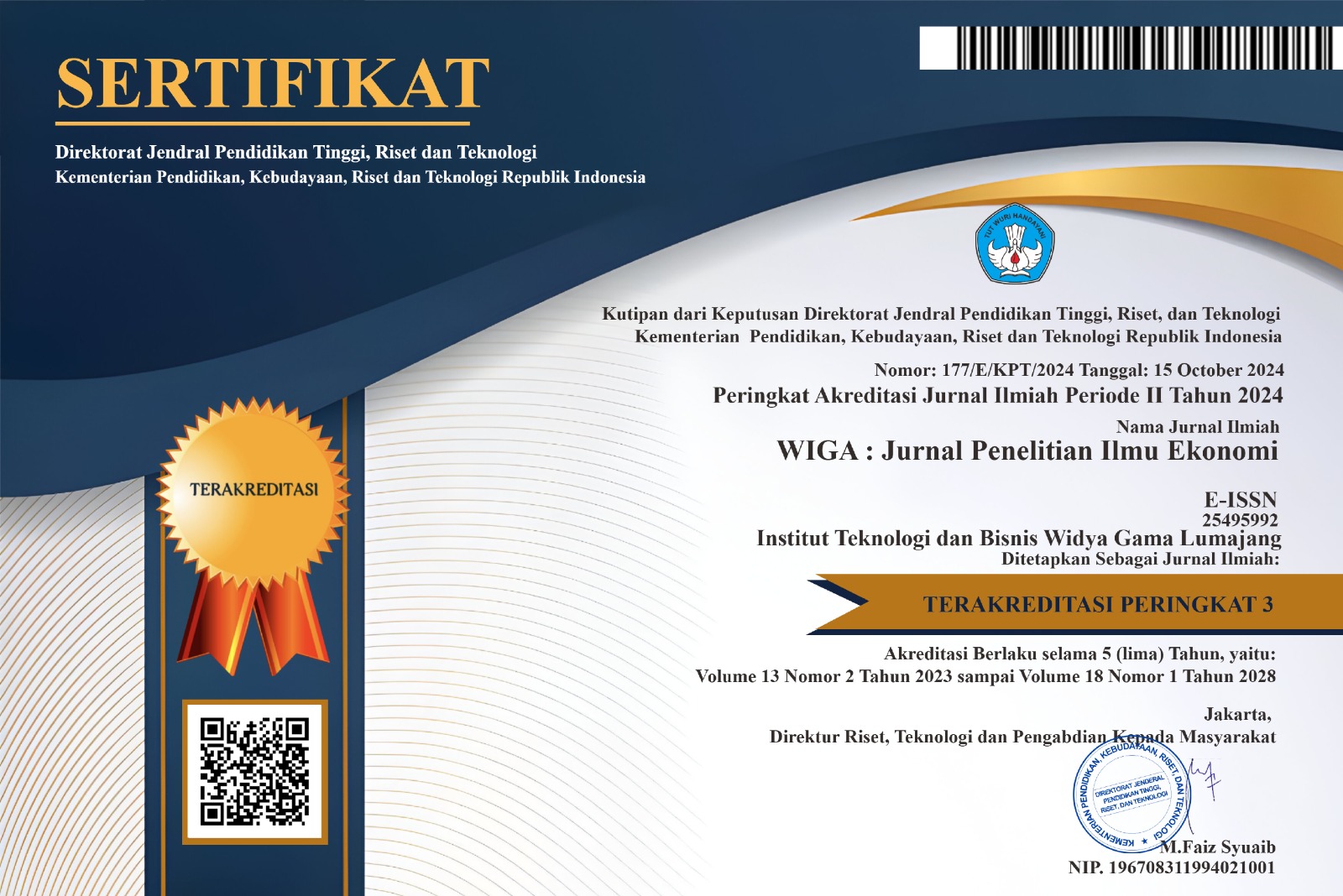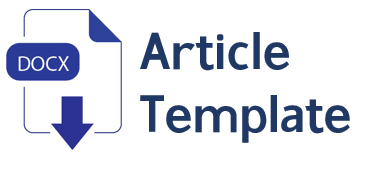New Perspective: Measuring Auditor Professionalism in Fraud Detection
DOI:
https://doi.org/10.30741/wiga.v10i2.623Keywords:
Auditor Professionalism, Fraud, Fraud DetectionAbstract
This research provides a new point of view to measure the professionalism of BPKP auditors in the field of investigation by utilizing the professionalism stated in the Regulation of the Head of BPKP 2010. The research was conducted on BPKP auditors in Java and Bali by filling out a questionnaire distributed via google form. From the distributed questionnaire obtained 51 respondents who participated in this study. Based on the data obtained, hypothesis testing was carried out using the Structural Equation Model (SEM) with the SmartPLS version 3.2.6 software. The results prove that auditor professionalism has a positive and significant effect on fraud detection as evidenced by the t-statistic of 7.526. In other words, the higher the professionalism of the investigative BPKP auditors, the higher their ability to detect fraud. The results also prove that professionalism according to the Regulation of the Head of the BPKP Year 2010 has been carried out properly by the BPKP auditors in the field of investigation and has truly become a work culture that must be carried out.
Downloads
References
Agusti, R., & Pertiwi, N. P. (2013). Pengaruh Kompetensi, Independensi dan Profesionalisme terhadap Kualitas Audit (Studi Empiris pada Kantor Akuntan Publik Se Sumatera). Jurnal Ekonomi, 21(3 September), 1–13.
Albrecht, C., Turnbull, C., Zhang, Y., & Skousen, C. J. (2010). The relationship between South Korean chaebols and fraud. Management Research Review, 33(3), 257–268. https://doi.org/10.1108/01409171011030408
Albrecht, W. S., Albrecht, C. C., & Albrecht, C. O. (2004). Fraud and Corporate Executives: Agency, Stewardship and Broken Trust. Journal Of Forensic Accounting, V, 109–130.
Albrecht, W. S., Albrecht, C. C., Albrecht, C. O., & Zimbelman, M. (2009). Fraud Examination (3rd Editio). Canada: Nelson Education, Ltd.
Arumsari, A. L., & Budiartha, I. K. (2016). Pengaruh Profesionalisme Auditor, Independensi Auditor, Etika Profesi, Budaya Organisasi, dan Gaya Kepemimpinan Terhadap Kinerja Auditor pada Kantor Akuntan Publik di Bali. E-Jurnal Ekonomi Dan Bisnis Universitas Udayana, 5(8), 2297–2304.
Atmaja, D. (2016). Pengaruh Kompetensi, Profesionalisme, dan Pengalaman Audit terhadap Kemampuan Auditor Badan Pemeriksa Keuangan (BPK) dalam Mendeteksi Fraud dengan Teknik Audit Berbantuan Komputer (TABK) sebagai Variabel Moderasi. Media Riset Akuntansi, Auditing & Informasi, 16(1), 53–68.
Bhasin, M. (2013). Corporate Accounting Scandal At Satyam: A Case Study Of India’s Enron. European Journal of Business and Social Sciences, 1(12), 25–47.
BPKP. (2010). Peraturan Kepala Badan Pengawasan Keuangan dan Pembangunan.
Dewayani, R. A., & Chariri, A. (2015). Money Laundering dan Keterlibatan Wanita (Artis): Tantangan Baru Bagi Auditor Investigatif. Diponegoro Journal of Accounting, 4(3), 1–6.
Dewi, P. P., & Murti, A. . T. A. (2019). Faktor-Faktor yang Mempengaruhi Kualitas Audit. Media Bina Ilmiah, 13(7), 1361–1368.
DP, E. N., Julita, & Wahyudi, D. P. (2014). Pengaruh Etika, Kompetensi, Pengalaman Auditor dan Situasi Audit terhadap Ketepatan Pemberian Opini Audit Melalui Pertimbangan Materialitas dan Skeptisisme Profesional Auditor. Jurnal Ilmiah STIE MDP, 3(2), 116–132.
Gashi, M. (2016). Preconditions That Affect in Increasing Control Effect and Increased Chance for tax Fraud Detection. International OFEL Conference on Governance. Management and Entrepreneurship, 436–443.
Ghozali, I. (2014). Struktural Equation Model: Metode Alternatif dengan Partial Least Squares (PLS) (Edisi 4). Semarang: Universitas Diponegoro Semarang.
Ghozali, I., & Latan, H. (2012). Partial Least Square: Konsep, Teknik dan Aplikasi SmartPLS 2.0 M3. Semarang: Badan Penerbit Universitas Diponegoro.
Hall, R. H. (1968). Professionalization and Bureaucratization. American Sociological Review, 33(1), 92–104.
Heyrani, F., Banimahd, B., & Roudposhti, F. R. (2016). Investigation of the Effect of Auditors ’ Professionalism Levels on Their Judgment to Resolve the Conflict between Auditor and Management. Procedia Economics and Finance, 36, 177–188. https://doi.org/10.1016/S2212-5671(16)30029-6
Ira, N., & Nofryanti. (2016). Pengaruh Profesionalisme dan PengalamanAuditor terhadap Kemampuan Auditor dalam Mendeteksi Kecurangan. Jurnal Ilmiah Akuntansi, 4(2), 958–980.
Kumaat, V. G. (2011). Internal Audit. Jakarta: Erlangga.
Kummer, T., Singh, K., & Best, P. (2015). The Effectiveness of Fraud Detection Instruments In Not-For-Profit Organizations. Managerial Auditing Journal, 30(4/5), 435–455. https://doi.org/10.1108/MAJ-08-2014-1083
Lail, B., Macgregor, J., Marcum, J., & Stuebs, M. (2017). Virtuous Professionalism in Accountants to Avoid Fraud and to Restore Financial Reporting. Journal of Business Ethics, 140(4), 687–704. https://doi.org/10.1007/s10551-015-2875-y
Lampe, J. C., & Garcia, A. (2003). Professionalism in Internal Auditing. Internal Auditing, 18(6), 11.
Latan, H., Jabbour, C. J. C., & Jabbour, A. B. L. de S. (2018). “ Whistleblowing Triangle ”: Framework and Empirical Evidence. Journal of Business Ethics. https://doi.org/10.1007/s10551-018-3862-x
Levi, M., & Burrows, J. (2008). Measuring The Impact Of Fraud In The UK A Conceptual and Empirical Journey. British Journal Of Criminology, 48(3), 293–318. https://doi.org/10.1093/bjc/azn001
Mangala, D., & Kumari, P. (2015). Corporate Fraud Prevention and Detection : Revisiting The Literature. Journal of Commerce & Accounting Research, 4(1), 52–62.
Martak, M. N. M. (2015). Analisis Pengaruh Profesionalisme dan Komitmen Organisasi terhadap Prestasi Kerja Melalui Kepuasan Kerja pada Auditor Kantor Akuntan Publik di Surabaya. Jurnal Ekonomi Dan Bisnis, XXV(1), 54–68.
Matarneh, A. J., Moneim, U. A., & Al-nimer, M. (2015). The Intellectual Convergence between the Forensic Audit and the External Auditor toward the Professionalism in Jordan. International Journal of Business and Management, 10(11), 138–148. https://doi.org/10.5539/ijbm.v10n11p138
Mulyadi. 2014. Auditing. Edisi Keenam. Bandung: Salemba Empat
Munteanu, V., Copcinschi, L., Luschi, C., & Laceanu. (2017). Internal Audit – Determinant Factor In Preventing And Detecting Fraud Related Activity To Public Entities Financial Accounting. Knowledge Horizons - Economics, 9(1), 55–63.
Ramamoorti, S. (2008). The Psychology and Sociology of Fraud : Integrating the Behavioral ... Issues in Accounting Education, 23(4), 521–533.
Sastiana, & Sumarlin. (2016). Pengaruh Audit Forensik Dan Profesionalisme Auditor Terhadap Pencegahan Fraud Dengan Kecerdasan Spiritual Sebagai Variabel Moderating Pada Perwakilan BPKP Provinsi Sulawesi Selatan. Akuntansi Peradaban, I(1), 106–127.
Suganda, T. R., Ambarwati, S., & Astuti, T. (2018). Pengaruh Skeptisisme Profesional, Independensi, Dan Pengalaman Auditor Terhadap Kemampuan Auditor Mendeteksi Fraud. Jurnal Liquidity, 7(1), 19–25.
Sukesi, S. (2015). Pengaruh Karakteristik Personal Auditor Terhadap Penerimaan Perilaku Disfungsi Audit pada Unit Organisasi TNI Angkatan Laut. Media Riset Akuntansi, Auditing & Informasi Vol., 15(2), 161–170.
Vinciguerra, B. M. (2001). Auditor Independence: An Examination of the Effect of Self-Interest Threats and Organizational Safeguards on Auditor Judgment. Drexel University. Proquest Dissertations Publishing.
Windasari, M. Y., & Juliarsa, G. (2016). Pengaruh Kompetensi, Independensi, dan Profesionalisme Auditor Internal dalam Mencegah Kecurangan pada BPR di Kabupaten Badung. E-Jurnal Akuntansi Universitas Udayana, 17(3), 1924–1952.
Yudha, P. A., Sujana, E., & Purnamawati, G. A. (2017). Pengaruh Kompleksitas Audit, Due Professional Care, Tekanan Anggaran Waktu, dan Pengalaman Auditor terhadap Kualitas Audit dengan Variabel Moderasi Pemahaman terhadap Sistem Informasi (Studi Empiris pada Auditor KAP di Bali). E-Journal S1 Ak Universitas Pendidikan Ganesha, 8(2).
https://www.integrity-indonesia.com/id/blog/2017/09/14/skandal-keuangan-perusahaan-toshiba/ (Accessed on 5 June 2019)
Downloads
Published
How to Cite
Issue
Section
License
Copyright (c) 2020 Heni, Yosefa Sayekti, Siti Maria Wardayati

This work is licensed under a Creative Commons Attribution-ShareAlike 4.0 International License.










